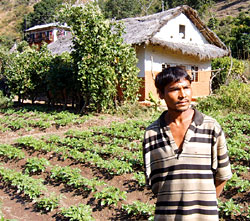 For a hill district that is this fertile, endowed with forests and water resources and already furnished with roads and electricity, there shouldn't have been a problem to raise living standards in Pyuthan.
For a hill district that is this fertile, endowed with forests and water resources and already furnished with roads and electricity, there shouldn't have been a problem to raise living standards in Pyuthan. However, this midwestern hill district stands as a classic example of the failure to fully harness the potential of the land thanks to years of neglect by Kathmandu and hurdles created by the conflict.
Pyuthan has been the incubator of the country's most renowned revolutionaries. Some of the top names in Nepal's political leadership are also from here, yet until a few years ago villages located an hour from the road did not have safe drinking water.
"I went to the district office 17 times just to beg for water pipes and each time I was ignored," says Dilaram Bhandari, 49, of Barjibang VDC. Finally, the British aid ministry DfID-funded Livelihoods Forestry Program (LFP) stepped in to implement the water project. "If the pipes hadn't come, we would have had to migrate to India long ago," adds villager Nar Bahadur Gurung.
Locals have given up on both the government and the Maoists to get development work done and are now doing it themselves with a little help from donors.
Despite the private-sector Jhimruk hydropower project being located here, 23 households of Kumals, one of Nepal's most underprivileged groups, continued to live in poverty. The men spent their days fishing or migrated to India to work. They had farms but no irrigation.
Ram Bahadur Kumal (pictured) had earned a dubious reputation for being a village drunk. He fished on the river all day and with the money from selling his fish was usually sloshed by nightfall.
The LFP worked with the Butwal Power Company that runs Jhimruk to launch an irrigation scheme. Together with a community group, Fulbari, a water pump was installed to deliver water to the fields.
And that is all it took to transform the lives of Kumals like Ram Bahadur. Farms that used to produce one rice crop a year now produce multiple crops and several types of off-season vegetables. The villagers have enough left over to sell at the local market. In less than two years, hearing of the progress in their village, 20 men have returned from India.
A village committee manages the pump and the irrigation scheme. Ram Bahadur, 29, and a father of two children, has stopped drinking and says proudly, "I am going to educate my children and see that they do not have to live the life I lead."
SCEPTICAL OF MAOISTS
For Pyuthan's poor the Maoist ideology has never held much attraction. Many openly say that the conflict has delayed development of their district.
"It's difficult getting lower-rank Maoist cadres to understand what we are trying to do. They are especially cautious about programs that help in social empowerment," explained one aid worker here.
Development workers in Pyuthan's interior face constant harassment at security checkpoints. Vehicle drivers have been warned to turn their lights off near army bases or risk being shot.
However, Maoist pressure has some positive aspects. Most projects, however small, must be completely transparent about spending and have become more result-oriented. The infamously extravagant lifestyles of development workers that earned project staff a bad reputation have been toned down. The Maoists are also asking development workers to work in remote areas where the need is greater. And because of the ceasefire, project staff can travel without fear.
In the Pyuthan district capital, however, administrators who felt safer after the ceasefire was extended earlier this month are nervous again because it is due to expire soon.


